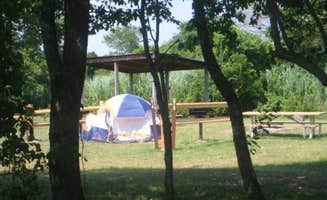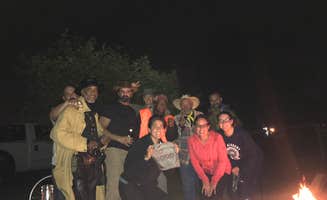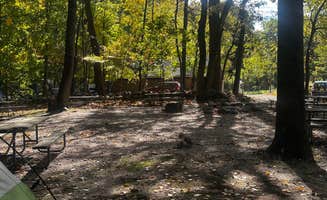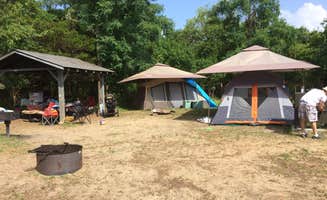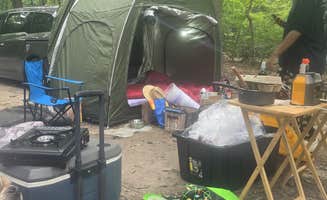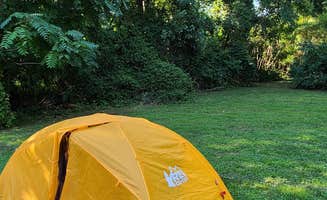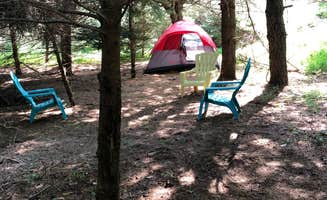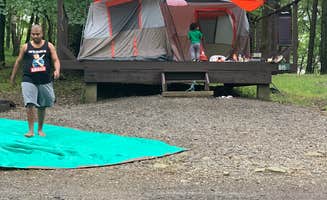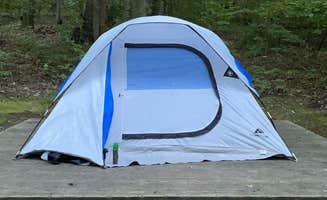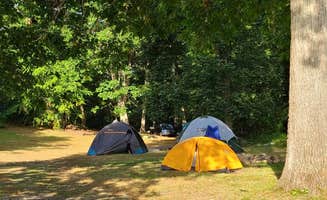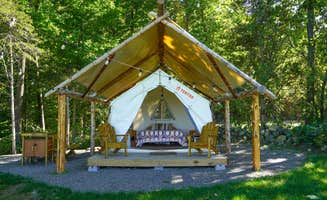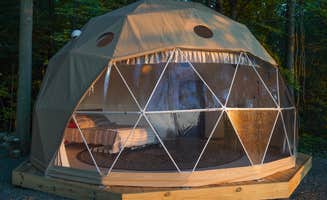New York City camping options vary in proximity to urban conveniences. Sites 30 to 90 minutes from Manhattan provide practical alternatives for New York NY camping experiences without long drives. While oceanfront locations exist, many campsites feature harbor or river views instead of forest settings. The camping season typically runs April through October, with shoulder seasons offering greater availability and fewer crowds.
What to do
Beach activities: 5-10 minute walk from Sandy Hook — Gateway National Recreation Area to swimming areas with lifeguards present. "Ocean is close with lifeguards. Good fishing and pleasant people. Boat from New York City," notes Stanley S.
Urban exploration: free historic sites near Staten Island camping areas include abandoned buildings with ranger-led tours. "There are rangers taking you on a trek and exploring the abandoned building. This place is great if you live in New York city and don't want to drive really far from the city to go camping," explains Phillip L.
Cycling opportunities: paved trails at Nickerson Beach Park Campground connect to surrounding areas. "The island is very bikable to get around," states Mackenzie B., while Sandy Hook offers "a trail that runs parallel to the beach making it a scenic ride," according to Maggie A.
What campers like
Transportation access: multiple options for reaching Manhattan from many campgrounds. From Liberty Harbor RV Park, "the light rail is a block away, and the path train is about 8" blocks away, notes Joe R. Keith and Tia S. add it's "minutes walk to the Statue of Liberty, liberty Science center. Two blocks away from NJ Path train into Manhattan or take the ferry to Wall Street!"
Waterfront locations: Hudson River views at Croton Point Park provide scenic camping within 90 minutes of the city. "This must be one of the most breathtaking camp grounds right on the Hudson. With views from the campsite looking out to the sea, the skyline of NYC on the left & NJ on the right, it was awe inspiring and, the sunset was a real treat!!" reports Anil S.
Off-season flexibility: less crowding at Beaver Pond Campground during weekdays. "Ranger said that during summer weekends the grounds fill up and can be quite noisy, but mid-week during the off-season it was great," notes Rebecca S.
What you should know
Urban noise factors: train and traffic sounds affect several campgrounds. At Croton Point Park, "there is a train depot right outside and you can hear them shunting trains all night," warns Andrew A. Cheesequake State Park campers mention "the Parkway is right there so its not a nice quiet place," according to Stacey R.
Wildlife concerns: secure food properly at Beaver Pond Campground — Harriman State Park due to active wildlife. "The wildlife do roam around your campsite so be mindful of putting food and garbage away before sleeping," advises Kelvin. Bears are particularly active in this area, with one reviewer noting, "Welcome to Bear Mountain" was the ranger's greeting.
Site density varies: spacing differences between campgrounds can impact privacy. At Liberty Harbor, "sites very close to one another," reports Missy S., while Beaver Pond offers "spread out" sites where "you definitely feel like you have your own space and are not camping on top of your neighbor," according to Ethan K.
Tips for camping with families
Playground access: multiple options for children at various campgrounds. Croton Point Park has "a playground within sight of our camper," notes Thomas, while Cheesequake State Park is "a great site for families" with facilities nearby.
Swimming opportunities: seasonal beaches with varying water quality. Cheesequake State Park Campground offers swimming, though some campers note water clarity concerns. Croton Point has "a private beach which is opened from Wednesday to the weekend with life guards on duty!" according to Anil S.
Budget-friendly options: state parks offer lower rates compared to private campgrounds. Beaver Pond provides "camping for just $15," states Adaly, making it accessible for families looking to reduce costs while still accessing outdoor recreation near the city.
Tips from RVers
Parking limitations: space considerations affect site selection at most urban campgrounds. Liberty Harbor RV Park functions as "basically a parking lot with a dump station" where "if it's packed, your neighbor with be within inches of your rig," cautions Keith and Tia S.
City access planning: prioritize transportation from RV sites to Manhattan attractions. "If you're planning on seeing everything NYC has to offer, you can't get a better base camp," explains one Liberty Harbor visitor, though Kevin A. adds that while it's "very convenient location... the sites had electric and water and were in a fenced off section of the marina parking area."
Toll avoidance strategies: route planning can save significant costs. When driving to Liberty Harbor Marina and RV Park, Joe R. advises: "Getting in and out of the city is an adventure. Stay right off the highway to avoid the $30 tunnel toll. Follow RV life pro and not Waze."


